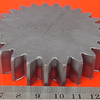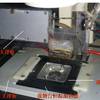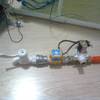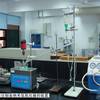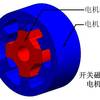基本信息
- 项目名称:
- CXCR1/CXCR2受体拮抗剂-G31P对C57BL/6鼠肺炎克雷伯杆菌肺炎的抑制作用
- 来源:
- 第十二届“挑战杯”作品
- 小类:
- 生命科学
- 大类:
- 自然科学类学术论文
- 简介:
- ELR+CXC趋化因子作为CXC趋化因子的一类。我们构建的ELR+CXC趋化因子受体拮抗剂G31P能高亲和力结合CXC趋化因子受体CXCR1/CXCR2,从而阻断ELR+CXC趋化因子对中性粒细胞的趋化作用,进而起到抗炎作用。本文研究G31P对C57BL/6鼠肺炎克雷伯杆菌肺炎的预防和抑制作用,并与头孢他啶和地塞米松治疗作用进行比较。
- 详细介绍:
- 目的:趋化因子是具有趋化作用的细胞因子, 能吸引免疫细胞到免疫应答部位,参与免疫调节和免疫病理反应。在维护免疫系统的自身稳态和功能方面扮演着重要的角色。ELR+CXC趋化因子作为CXC趋化因子的一类,在中性粒细胞炎症发生发展过程中起着重要的作用。我们构建的ELR+CXC趋化因子受体拮抗剂G31P能高亲和力结合CXC趋化因子受体CXCR1/CXCR2,从而阻断ELR+CXC趋化因子对中性粒细胞的趋化作用,进而起到抗炎作用。肺炎克雷伯杆菌(Kp)是目前较为常见的医院内机会致病菌。随着耐药株的增加,已成为防治的难点。本文研究G31P对C57BL/6鼠肺炎克雷伯杆菌肺炎的预防和抑制作用,并与头孢他啶和地塞米松治疗作用进行比较。方法:致病菌株:肺炎克雷伯杆菌,取自临床患者痰培养。LB培养取单菌落。根据细菌生长与OD值关系选择12~14h为细菌活性最强时间。动物模型建立:肺炎克雷伯杆菌(Kp)气管注射接种C57BL/6鼠激发肺炎,同时背部皮下注射G31P或生理盐水作为实验组和阳性对照组,并设抗生素和激素治疗对照组。检测方法:24h后取肺组织病理学检查,肺泡灌洗液(BALF)中性粒细胞计数,肺组织及肺泡灌洗液髓过氧化物酶(MPO)分析,肺组织RT-PCR检测趋化因子基因表达水平。结果:与细菌阳性对照组相比,G31P治疗组的中性粒细胞数量下降,髓过氧化物酶分泌减少,病理报告肺组织炎症减轻,RT-PCR结果显示ELR+CXC趋化因子表达量降低,与抗生素和激素治疗组相比较也有一定的疗效。结论:G31P可以明显减轻C57BL/6鼠肺炎克雷伯杆菌肺炎的炎性中性粒细胞浸润及肺组织损伤,对肺炎有一定的抑制作用 。 关键词:CXCR1/CXCR2拮抗剂 趋化因子 肺炎克雷伯杆菌 中性粒细胞 The combined CXCR1/CXCR2 antagonist CXCL8(3–72)K11R/ G31P blocks neutrophil infiltration and pulmonary pathology in C57BL/6mouse challaged by Klebsiella pneumoniae Abstract Objective: ELR (Glu-Leu-Arg)-CXC chemokines are important in acute responses to bacterial infections, wherein neutrophils are often critical to pathogen clearance. However, excessive neutrophil recruitment augments the pathology of many diseases. ELR+ CXC chemokines bind CXCR1 and/or CXCR2 with a high affinity and have a potent chemotactic effect, particularly on neutrophils. CXCR1 and CXCR2 are coordinately expressed on the leukocytes. However, CXCR1 exhibits a slightly lower affinity for CXCL8 in vitro and requires more CXCL8 for internalization and recycling than CXCR2. Moreover, synthesis and release of CXCL8 can be induced by bacteria, bacterial products [e.g., lipopolysaccharide (LPS)]. We have developed a broad-spectrum ELR+CXC chemokine antagonist, CXCL8(3–72)K11R/G31P. In vitro, it effectively blocks neutrophil responses to CXCR1- and CXCR2-specific agonists, and ablates neutrophil responses to all mediators present in clinical bacterial pneumonia lesions. Klebsiella pneumoniae (Kp), accounts for a significant proportion of hospital-acquired urinary tract infections, pneumonia, septicemias, and soft tissue infections. Therefore, in this experiment we are trying to find out whether G31P also works very well in a C57BL/6mouse model of acute lung inflammation induced by the Klebsiella pneumoniae. Methods: For the preparation of the bacteria, we chose the optimal growth stage by drawing the time-growth curve of bacterium and diluted it with sterile saline. Then C57BL/6mouse were challenged with 0.2ml (10*9 cfu /ml) of Klebsiella pneumoniae through transtracheal injection. Meanwhile, administrated G31P(500ug/kg) or the same volume sterile saline as positive control by subcutaneously injection on the back. Also established antibiotic and hormones treated group. The C57BL/6mouse were sacrificed 24h later. Then count the number of neutrophils, assay the release of myeloperoxidase(MPO) in both lung tissue and the bronchoalveolar lavage fluid(BALF), observate the appearance of lung tissue and lung histopathology respectively. The RT-PCR was used to assay the expression of CXCL8 (IL-8), TNF and CXCL1 (IL-1) with a commercial one-step master mix kit. Results: The results show that, compared with the control group, the number of neutrophils decreased significantly, the secretion of MPO in both lung tissue and BALF dropped in G31P group, and there are a lot of differences in histopathology between G31P treated group and control. The mRNA level of inflammatory cytokines in G31P treated group were lower than that of control. The differences also happened between G31P treated group and antibiotic, hormones groups . Conclusion: The combined CXCR1/CXCR2 antagonism-G31P had a significant therapeutic effect on C57BL/6mouse pulmonary inflammation and hemorrhage induced by Kp. In a word, G31P can partly block netrophil influx and tissue hemorrhage so as to exert a certain effect on this pneumonia model. Compared with antibiotic and hormones group, G31P treated group showed more effective. Keyword: chemokine inflammation CXCR1/CXCR2 Kp (Klebsiella pneumoniae)
作品专业信息
撰写目的和基本思路
- ELR+CXC趋化因子作为CXC趋化因子的一类。我们构建的ELR+CXC趋化因子受体拮抗剂G31P能高亲和力结合CXC趋化因子受体CXCR1/CXCR2,从而阻断ELR+CXC趋化因子对中性粒细胞的趋化作用,进而起到抗炎作用。本文研究G31P对C57BL/6鼠肺炎克雷伯杆菌肺炎的预防和抑制作用,并与头孢他啶和地塞米松治疗作用进行比较。
科学性、先进性及独特之处
- 【1】动物模型的制备:通过对小鼠颈部手术,直接向小鼠肺内注射肺炎克雷伯杆菌,防止小鼠将菌液吞入消化道 【2】小鼠克雷伯杆菌肺炎的治疗方法:应用CXCR1/2受体拮抗剂G31P抑制炎症细胞对肺炎组织的损伤
应用价值和现实意义
- 对制备成功的克雷伯杆菌肺炎小鼠模型,用CXCR1/2受体拮抗剂G31P治疗,中性粒细胞计数、髓过氧物酶测试、肺组织病理学观察、炎症因子表达等观察指标应显示该拮抗剂对小鼠肺炎有一定的抑制作用。 通过对CXCR1/2受体拮抗剂G31P的作用机理分析,它不仅具有抑制炎症过度反应的作用,还具有毒副作用小的特点,未来有望应用于临床。
学术论文摘要
- 目的:本文研究G31P对C57BL/6鼠肺炎克雷伯杆菌肺炎的预防和抑制作用,并与头孢他啶和地塞米松治疗作用进行比较。方法:致病菌株:肺炎克雷伯杆菌,取自临床患者痰培养。LB培养取单菌落。根据细菌生长与OD值关系选择12~14h为细菌活性最强时间。动物模型建立:肺炎克雷伯杆菌(Kp)气管注射接种C57BL/6鼠激发肺炎,同时背部皮下注射G31P或生理盐水作为实验组和阳性对照组,并设抗生素和激素治疗对照组。结果:与细菌阳性对照组相比,G31P治疗组的中性粒细胞数量下降,髓过氧化物酶分泌减少,病理报告肺组织炎症减轻,RT-PCR结果显示ELR+CXC趋化因子表达量降低,与抗生素和激素治疗组相比较也有一定的疗效。结论:G31P可以明显减轻C57BL/6鼠肺炎克雷伯杆菌肺炎的炎性中性粒细胞浸润及肺组织损伤,对肺炎有一定的抑制作用 。 关键词:CXCR1/CXCR2拮抗剂 趋化因子 肺炎克雷伯杆菌 中性粒细胞
获奖情况
- 辽宁省课外科技作品大赛特等奖
鉴定结果
- 符合大赛要求
参考文献
- 1. N. Godessart, Chemokine receptors:attractive targets for drug discovery,Ann. N.Y. Acad. Sci. 1051 (2005) 647–657. 2.C.L. Addison, T.O. Daniel, M.D. Burdick, H. Liu, J.E. Ehlert and Y.Y. Xue et al., The CXC chemokine receptor 2, CXCR2, is the putative receptor for ELR+ CXC chemokine-induced angiogenic activity, J Immunol 165 (2000) (9), pp. 5269–5277. 3. Pathophysiological roles of interleukin-8/CXCL8 in pulmonary diseases Am J Physiol Lung Cell Mol Physiol 284: L566–L577, 2003; 4.Cripps AW,Dunkley ML,Clancy RI,Kyd j.Pulmonary immunity to Pseudomonas aeruginosa.Immunol Cell Biol.1995,73:418-24. 5.Bharat B.Aggarwal,Shishir Shishiodia,Santosh K.Sandur,Manoj K.Pandey,Gautam Sethi.Inflammation and cancer:How is the link? Bionchemical pharmacology.2006,72:1605-1621.
同类课题研究水平概述
- 关于CXCR1/CXCR2受体拮抗剂-G31P对鼠肺炎的抑制作用这个课题,很多研究者在进行研究,其中不乏国内和国外的优秀的研究者。但这项课题还没有别应用于临床。






